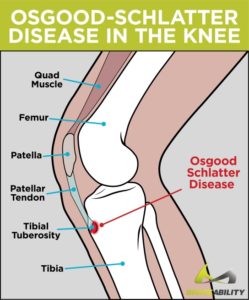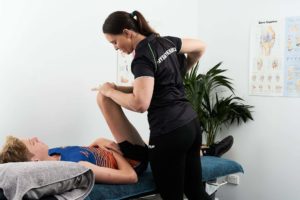What is Osgood schlatters?
Osgood Schlatters is a traction apophysitis, and occurs most commonly in young males aged 13-14 and females aged 10-11. One or both knees can be symptomatic, and onset often coincides with a growth spurt. The exact incidence & prevalence is unknown, but some studies suggest up to 20% of children will experience this kind of injury.
In the next part of the article, Elevate Training Centre’s Lead physiotherapist will explain what is Osgood Schlatters and what are the recommended treatments for each situation:
What do we hear from patients?
A young athlete experiencing Osgood schlatters will often report the following:
- Gradual onset of pain at the front of the knee, often exacerbated during a growth spurt
- Aggravated by running, jumping, kneeling, descending stairs
- Eased by rest, activity modification, NSAIDS

Image source: https://www.agnesian.com/blog/osgood-schlatter-disease
What do we see during assessments?
Osgood Schlatters is simply identified in clinics, and much of what is looked at during an assessment is aimed at identifying the potential musculoskeletal and biomechanical contributors that are amenable to physiotherapy intervention. Common findings include:
- Prominent tender tuberosity at the front of the knee
- Tight quadriceps
- Reduced ankle range especially into dorsiflexion – joint and soft tissue restriction
- Excessive pronation, tibial or femoral internal rotation
What else could it be?
It is important to differentiate between Osgood Schlatters and other types of anterior knee pain. These could include
- Patellofemoral Pain Syndrome
- Patellar tendinopathy/tendon injury
- Sinding-Larsson-Johansson syndrome
- Osteochondritis Dissecans
- Bursitis
- Fat pad impingement
- Referral from hip
- Red flag conditions

Do I need to get a scan done?
Imaging is not routinely required with this group of athletes and diagnosis can be made simply during clinical assessment. If symptoms are severe or unrelenting, further investigations are merited to rule out other more serious conditions such as malignancy, or infection.
How do we manage Osgood schlatters?
Osgood Schlatters is more often than not managed conservatively and involves educating the athlete, parents, and coaches, as their cooperation is often required in implementing the players rehabilitation.
There are lots of interventions that can be trialled, and are often dependent on how an athlete presents clinically:
- Icing the knee following aggravating activities
- Pain relief/NSAIDS as required
- Stretching of tight quadriceps – during the acute stages this may be minimised
- Activity modification – a very important concept to understand. This might include reducing training sessions or modifying the duration/intensity of a session for a period of time
- In very severe cases, total rest might be recommended but is uncommon. An appropriate exercise program should be include to minimise atrophy/deconditioning
- Correction of biomechanical factors including tightness of the calves, hamstrings, & quads and weakness of the pelvic stabilisers, quadriceps, and foot musculature.
- Taping & bracing techniques might also assist
Is surgery required?
The majority of athletes return to play successfully with conservative management. If a player remains symptomatic after 10 weeks of rest, or with persistent symptoms after skeletal maturity, surgical intervention may be required. This occurs in less than 2% of all cases.
What is the expected outcome?
Osgood Schlatters is a self limiting condition, which generally resolves when an athlete achieves skeletal maturity. With appropriate management and well-rounded team approach, most athletes can continue to play.
About the author
This was a great new blog by North Brisbane based Physiotherapist, Karen Jamieson. Karen graduated from The University of Queensland in 2015 and has worked in private practice physiotherapy since then. She is currently the director and Head Physiotherapist for North Brisbane based Elevate Training Centre, and shares a special interest in working with adolescent & adult athletes across a variety of sports and levels. Karen has played football (soccer) for over 20 years up to state level, as well as multiple other sports and is an active mum with 4 beautiful children.

